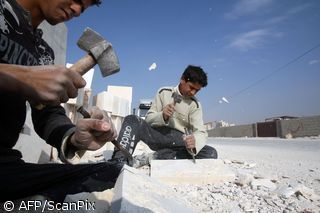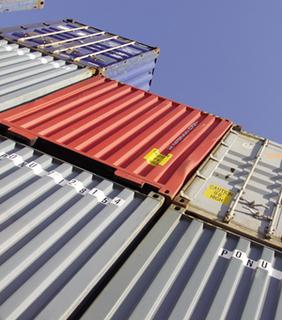The central bank governor is warning that the euro is not the cure for all Poland's ills
Published:
19 January 2005 y., Wednesday
The central bank governor Leszek Balcerowicz is warning that the euro is not the cure for all Poland's ills.
Leszek Balcerowicz believes the government should focus on reforms to yield long-term economic growth, rather than rushing to join the single currency.
"I never said that Poland should enter [the eurozone] at any cost. I said the best strategy is to fulfill conditions for euro entry in a rapid and sustained way," said Balcerowicz, while attending a meeting of central bank governors last week. "The process of EU enlargement was conducive to reforms. The idea of euro entry should be a similar incentive."
Balcerowicz has frequently said that eurozone entry is a political, rather than an economic issue, and that taxes and spending are currently too high for single-currency membership. He also said that tougher reforms were necessary to free Poland from the shackles of long-term high unemployment. In the 1990s, his economic treatments helped Poland recover from the collapse of communism.
"It will pay for Poland to undergo fiscal consolidation," he said. "Unemployment in Poland is not due to over-excessive market-oriented reforms. All of the reasons are structural. There has been some labor market liberalization but I think we need much more decisive action."
Despite his comments, the Civic Platform (PO) party, which is expected to win the next general election, says eurozone entry by 2009 will be a key objective for the party. "Our government will have the strategic goal of adopting the euro by 2008 or 2009. We will do everything to make sure it happens," said Zbigniew Chlebowski, deputy head of the Platform's parliamentary group.
Chlebowski also hinted at the future government's economic policy plans, saying major reform initiatives-such as its flat-tax proposals-would be launched at the start of 2007, not in 2006 as earlier signaled. He also said that limiting the budget deficit in 2006 would be difficult because of the outgoing government's spending promises but that fiscal policy would tighten from 2007.
Šaltinis:
wbj.pl
Copying, publishing, announcing any information from the News.lt portal without written permission of News.lt editorial office is prohibited.
The most popular articles
 The European Commission has approved, under EC Treaty state aid rules, an Italian framework temporarily adapting certain existing risk-capital schemes to increase companies' financing possibilities during the current economic crisis.
more »
The European Commission has approved, under EC Treaty state aid rules, an Italian framework temporarily adapting certain existing risk-capital schemes to increase companies' financing possibilities during the current economic crisis.
more »
 The European Commission has authorised, under EC Treaty state aid rules, a Maltese measure to help businesses to deal with the current economic crisis.
more »
The European Commission has authorised, under EC Treaty state aid rules, a Maltese measure to help businesses to deal with the current economic crisis.
more »
 We're making progress. That's the word from Treasury Secretary Tim Geithner about settling the financial markets.
more »
We're making progress. That's the word from Treasury Secretary Tim Geithner about settling the financial markets.
more »
 According to a new report released by NextGen Research, global markets for financial kiosks and enhanced ATMs will grow at a compound annual rate of 9 percent, to include more than 186,000 financial kiosks and nearly 2.5 million ATMs by 2013.
more »
According to a new report released by NextGen Research, global markets for financial kiosks and enhanced ATMs will grow at a compound annual rate of 9 percent, to include more than 186,000 financial kiosks and nearly 2.5 million ATMs by 2013.
more »
 Non-farming Latvians are buying pigs to beat the economic crisis.
more »
Non-farming Latvians are buying pigs to beat the economic crisis.
more »
 Is your money well spent at EU level? Every year, in April, the EP concludes its examination of EU spending for the financial year closed 16 months previously.
more »
Is your money well spent at EU level? Every year, in April, the EP concludes its examination of EU spending for the financial year closed 16 months previously.
more »
 In the construction sector, seasonally adjusted production1 decreased by 1.0% in the euro area2 (EA16) and by 2.1% in the EU272 in March 2009.
more »
In the construction sector, seasonally adjusted production1 decreased by 1.0% in the euro area2 (EA16) and by 2.1% in the EU272 in March 2009.
more »
 Between 2000 and 2008, EU27 trade in goods with Russia more than tripled in value, with EU27 exports to Russia rising to 105 bn euro in 2008 from 23 bn in 2000.
more »
Between 2000 and 2008, EU27 trade in goods with Russia more than tripled in value, with EU27 exports to Russia rising to 105 bn euro in 2008 from 23 bn in 2000.
more »
 The European Commission has launched today a call for proposals covering key energy infrastructure projects such as energy interconnections, offshore wind energy and carbon capture and storage as part of the implementation of the EEPR.
more »
The European Commission has launched today a call for proposals covering key energy infrastructure projects such as energy interconnections, offshore wind energy and carbon capture and storage as part of the implementation of the EEPR.
more »
 During its plenary session on 13 May 2009, the European Economic and Social Committee adopted a key opinion on responding to the crisis in the European automotive industry.
more »
During its plenary session on 13 May 2009, the European Economic and Social Committee adopted a key opinion on responding to the crisis in the European automotive industry.
more »